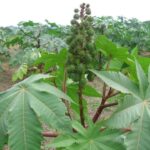The castor bean plant (Ricinus Communis L.) is known not only for its oil but also for its potential in pest control in agriculture. This article explores how extracts from the castor bean can be effectively used to combat pests, viruses, or parasites in crops.

Castor Bean as a Pest Control Agent
Extracts from the castor bean have shown to have insecticidal, fungicidal, and nematicidal properties, making them a valuable option for integrated pest management. Their use can help reduce the dependence on synthetic chemicals, contributing to more sustainable and environmentally friendly agriculture.

Effectiveness and Application
The effectiveness of the castor bean in pest control varies depending on the target species and the method of application. Studies indicate that the extracts can be especially effective against certain pests that are difficult to control with conventional insecticides.

Environmental and Economic Benefits
By using the castor bean as a pest control agent, farmers can benefit from reduced insecticide costs and a lower environmental impact. Additionally, cultivating castor beans can be an additional source of income, especially in regions where other plants do not thrive as easily.
Challenges and Future Considerations
Although promising, the use of castor bean as a pest control agent still faces challenges such as the standardization of extracts and evaluating their long-term impact on ecosystems. Ongoing research is crucial to maximize its potential in sustainable agriculture.
Conclusion
The castor bean emerges as a promising and natural alternative for pest control in agriculture. Its use represents a step towards more sustainable and environmentally friendly agricultural practices, aligned with the needs of a constantly changing world.
 AgronoBlog – Agriculture Blog
AgronoBlog – Agriculture Blog 


